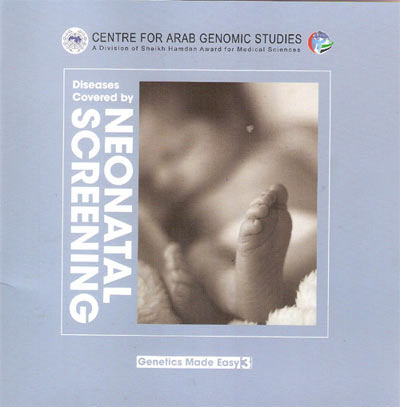Center for Arab Genomic Studies (CAGS), a division of Sheikh Hamdan Bin Rashid Al Maktoum Award for Medical Sciences, recently published a booklet entitled "Diseases Covered by Neonatal Screening". The book is the 3rd issue of the "Genetics Made Easy" series issued by the Award. It is published in English with an Arabic translation.
Dr. Mahmoud Taleb Al Ali, Director of CAGS, pointed out that the issuance of the book comes in the framework of the tireless efforts exerted by the Award to increase health awareness among non-specialists, particularly in the context of genetic disorders.
"The book deals with six major diseases covered by Neonatal Screening programs in the Arab countries including Congenital Adrenal Hyperplasia, Congenital Hyperinsulinism, Congenital Hypothyroidism, Cystic Fibrosis, Homocystinuria and Phenylketonuria", he said.
"These diseases could be divided into two categories; diseases caused by a hormonal deficiency of an endocrine gland and diseases resulting from an enzamtic deficiency leading to a metabolic disorder, because of the toxic accumulation of certain elements in the human body. Such accumulation can harm the functions of vital organs such as the nervous system", he said.
"Early detection and management of these diseases play a pivotal role not only in saving the lives of many babies but also in avoiding future suffering from serious irreversible disabilities, which may occur due to the progression of the disease over time", Dr. Mahmoud Taleb said.
"The book reviews the causes of these diseases and their symptoms, diagnosis and management as well as prevalence rates among Arabs according to data from CAGS’ Catalogue for Transmission Genetics in Arabs (CTGA)", he added.
"The UAE commenced neonatal screening activities in 1995. Over the years, the number of the diseases covered has doubled and tripled. Positively, it has resulted in the timely intervention and treatment for affected children. Also, the survey itself has become faster and more efficient using state-of-art equipment such as the tandem mass spectrometry (MS/MS)", he said.
"Concerning Congenital Hypothyroidism, it affects 94 children out of every one hundred thousand newborns in the UAE as a result of the deficiency of the thyroid hormone. Infants born with the disease may be asymptomatic or show mild symptoms that are not recognized as a serious problem such as; excessive sleeping, lack of breastfeeding, low muscle tone, infrequent bowel movement, jaundice, and a low hoarse cry. Over time and with severe shortage of the thyroid hormone, infants may develop the following: a puffy face, a large fontanel, an umbilical hernia and a large tongue. Then, they are often slow to grow, sluggish and have learning delays and other health problems e.g. mental retardation", he added.
"The disease can be easily detected by measuring the level of the thyroid hormone and TSH on the second or third day of life. If thyroid hormone levels are too low or TSH is too high, the infant has to start a proper treatment within the first one to two weeks of life. Infants are given a daily dose of thyroid hormone replacement. Regularly, thyroid hormone and TSH levels are rechecked to confirm that they are being normalized by treatment and that physical and mental growth is happening as it should be", Dr. Al Ali said.
"Although, the treatment of Congenital Hypothyroidism is simple, effective and inexpensive, delaying the detection of the disease till after the 1st month of life leads to less than 50% of severe hypothyroidism cases to be recognized", he added.
It is noteworthy that the prestigious Sheikh Hamdan Bin Rashid Al Maktoum Award for Medical Sciences has launched the project of issuing the "Genetics made easy" in 2010 through the publication of two books entitled "Hematology" and "Cancers". The publications of the series are distributed free of charge in hospitals, medical centers and other institutions within the United Arab Emirates.

